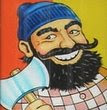
Could the delay in CNN coverage of the Iranian turmoil be due to a lack of marching orders? Where do we stand on this? Has the President said anything?
That's one good thing about having principles; you don't have to consult with anyone before you can know how to feel. Myself, I think many of the people who voted for Mousavi are pro Western, though certainly not all. And Mousavi would probably be more reasonable than Ahmadinejad, though you can never be 100% sure of such stuff. But overriding all of that is the fact that it looks like the election was stolen. And I'm agin' that.
***Update: From Stratfor- More input, could be right, could be wrong, but it's worth considering. Partial conclusion: "Ahmadinejad’s victory is a triumph of both democracy and repression.":
There are undoubtedly people who want to liberalize the Iranian regime. They are to be found among the professional classes in Tehran, as well as among students. Many speak English, making them accessible to the touring journalists, diplomats and intelligence people who pass through. They are the ones who can speak to Westerners, and they are the ones willing to speak to Westerners. And these people give Westerners a wildly distorted view of Iran. They can create the impression that a fantastic liberalization is at hand — but not when you realize that iPod-owning Anglophones are not exactly the majority in Iran.
Last Friday, Iranian President Mahmoud Ahmadinejad was re-elected with about two-thirds of the vote. Supporters of his opponent, both inside and outside Iran, were stunned. A poll revealed that former Iranian Prime Minister Mir Hossein Mousavi was beating Ahmadinejad. It is, of course, interesting to meditate on how you could conduct a poll in a country where phones are not universal, and making a call once you have found a phone can be a trial. A poll therefore would probably reach people who had phones and lived in Tehran and other urban areas. Among those, Mousavi probably did win. But outside Tehran, and beyond persons easy to poll, the numbers turned out quite different.
Some still charge that Ahmadinejad cheated. That is certainly a possibility, but it is difficult to see how he could have stolen the election by such a large margin. Doing so would have required the involvement of an incredible number of people, and would have risked creating numbers that quite plainly did not jibe with sentiment in each precinct. Widespread fraud would mean that Ahmadinejad manufactured numbers in Tehran without any regard for the vote. But he has many powerful enemies who would quickly have spotted this and would have called him on it. Mousavi still insists he was robbed, and we must remain open to the possibility that he was, although it is hard to see the mechanics of this.
Ahmadinejad’s Popularity
It also misses a crucial point: Ahmadinejad enjoys widespread popularity. He doesn’t speak to the issues that matter to the urban professionals, namely, the economy and liberalization. But Ahmadinejad speaks to three fundamental issues that accord with the rest of the country.
First, Ahmadinejad speaks of piety. Among vast swathes of Iranian society, the willingness to speak unaffectedly about religion is crucial. Though it may be difficult for Americans and Europeans to believe, there are people in the world to whom economic progress is not of the essence; people who want to maintain their communities as they are and live the way their grandparents lived. These are people who see modernization — whether from the shah or Mousavi — as unattractive. They forgive Ahmadinejad his economic failures.
Second, Ahmadinejad speaks of corruption. There is a sense in the countryside that the ayatollahs — who enjoy enormous wealth and power, and often have lifestyles that reflect this — have corrupted the Islamic Revolution. Ahmadinejad is disliked by many of the religious elite precisely because he has systematically raised the corruption issue, which resonates in the countryside.
Third, Ahmadinejad is a spokesman for Iranian national security, a tremendously popular stance. It must always be remembered that Iran fought a war with Iraq in the 1980s that lasted eight years, cost untold lives and suffering, and effectively ended in its defeat. Iranians, particularly the poor, experienced this war on an intimate level. They fought in the war, and lost husbands and sons in it. As in other countries, memories of a lost war don’t necessarily delegitimize the regime. Rather, they can generate hopes for a resurgent Iran, thus validating the sacrifices made in that war — something Ahmadinejad taps into. By arguing that Iran should not back down but become a major power, he speaks to the veterans and their families, who want something positive to emerge from all their sacrifices in the war.




0 comments:
Post a Comment